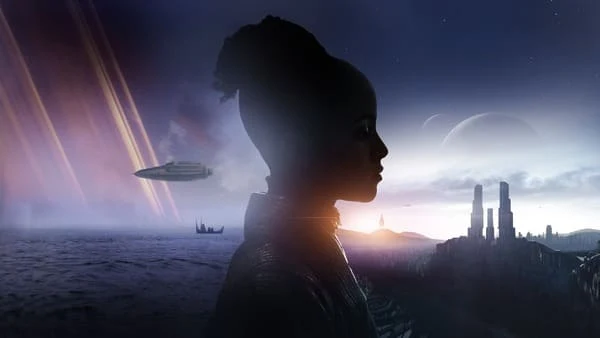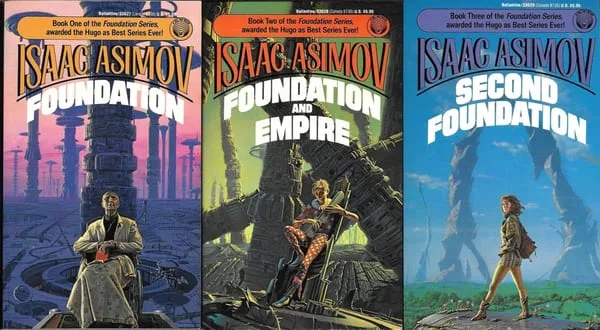Foundation TV Series Review: A Stellar Adaptation of Asimov's Classic Sci-Fi
Isaac Asimov's Foundation series is one of the most acclaimed science fiction series of all time. The Foundation TV series is a loose adaptation of the books, but it is still a faithful adaptation of the source material. The show is well-made and entertaining, and it is sure to please fans of science fiction.
In this blog post, I will review the Foundation TV series and discuss my thoughts on the show. I will also compare the show to the books and discuss how they differ.
Foundation TV Series Review: A Must-Watch for Fans of Science Fiction
"Foundation," the TV series, was loosely adapted from Isaac Asimov's critically acclaimed science fiction book series of the same name. Asimov's Foundation book series is regarded as one of the best science fiction series of all time. When news of a TV adaptation emerged, I couldn't contain my excitement.
Having read five books from Asimov's Foundation series, including the original trilogy and two sequels, I found myself left with just the two prequels to explore. Additionally, I delved into Asimov's Robot series, reading the short stories and one novel from that collection. Despite the brilliance of Asimov's science fiction works, I couldn't help but wonder why there were so few movie or TV adaptations of his stories.
Prior to the Foundation TV series, the only notable adaptation of Asimov's work was "I, Robot" in 2004. This left me curious about the absence of other adaptations, considering the exceptional quality of his novels and short stories. I discovered that legal and copyright issues had been hindering such projects. However, now we have the Foundation TV series, which has already aired its second season.
Related post: 30 Best Science Fiction Books, Novels, and Book Series of All Time (2023 Updated)
The Foundation TV series: Plot and story
Foundation is a science fiction television series based on the novels of Isaac Asimov. The show follows a group of exiles who are sent to the galactic periphery to create a foundation that will preserve knowledge and rebuild civilization after the collapse of the Galactic Empire. The show explores themes of politics, philosophy, and the nature of power.
The show is set in the distant future, where the Galactic Empire has ruled for 10,000 years. However, the Empire is beginning to decline, and a group of mathematicians and scientists believe that they can predict the future of the Empire. They are sent to the galactic periphery to create a foundation that will preserve knowledge and rebuild civilization after the Empire collapses.
The Foundation TV series follows the lives of these exiles as they struggle to create a foundation in a hostile galaxy. They must contend with political intrigue, religious fanaticism, and the threat of violence. However, they are determined to fulfill their mission and create a foundation that will ensure the survival of humanity.
Foundation TV Series Review and My Personal Commentary
When it comes to book adaptations, I usually prefer TV series that stay true to the main story. However, the Foundation TV series didn't entirely follow Asimov's novels, leading to some initial disappointment. I feared the producers might ruin the story. As a fan, I prefer faithful adaptations.
Yet, after watching the Foundation TV series and its first season of 10 episodes, my opinion shifted. Surprisingly, I found myself really enjoying it, even embracing some of the new elements they introduced. For instance, the exploration of the genetic dynasty within the Galactic Empire was an amazing concept, demanding viewers' attention. With time passing, the characters Brother Day, Brother Dusk, and Brother Dawn, all cloned from the same individual at different ages, will switch roles.
Beyond this, the TV series excelled in portraying space ships, space, planets, and everything related to the cosmos. When you delve into a TV series centered on space, the Galactic Empire, and diverse planets, the visualizations must meet high standards.
Related post: The 25 Best TV Series of All Time: A Definitive Ranking
Memorable Episodes: The Missing Piece and The First Crisis
The Foundation TV series' first season comprises ten gripping episodes, and having watched the series twice, I can't help but have two favorite episodes that left a lasting impression on me.
The Missing Piece (s01e08): In this episode, Brother Day embarks on a significant journey to the planet Helicon. This small planet, situated in the far reaches of the galaxy, holds immense significance as it is believed to be inhabited by descendants of the original founders of the Galactic Empire. Helicon symbolizes the Empire's origins and represents the potential for a better future.
Brother Day's mission on Helicon involves walking the Spiral, a sacred pilgrimage believed to bestow enlightenment upon those who complete it. This journey is an arduous test of both physical and spiritual strength. The main purpose behind this endeavor is to prove to the Luminists, a religious group questioning the soulfulness of the Genetic Dynasty, that Brother Day possesses a soul. According to the Luminists, only those with a soul can successfully navigate the Spiral. Throughout his perilous journey, Brother Day faces numerous challenges, including near-death experiences due to dehydration.
The First Crisis (s01e09): The second favorite episode centers around Brother Dawn, who becomes aware of his unique genetic problem that sets him apart from his siblings. He realizes that he doesn't conform to the mold of his other brothers, which puts him in danger. Feeling threatened by his differences, Brother Dawn decides to flee the palace, seeking safety and understanding outside its walls.
"The First Crisis" follows Brother Dawn's escape and the challenges he encounters while on the run. With the knowledge that his brothers may attempt to harm him, Brother Dawn's journey becomes a tense and suspenseful exploration of self-discovery and survival.
These two episodes showcase the depth of storytelling and character development in the Foundation TV series. They offer both exciting plotlines and meaningful reflections on the complexities of the characters' lives within the Galactic Empire.
I enjoyed both of these episodes because they explored the complex themes of the Foundation series. They also featured some great performances, especially from Lee Pace as Brother Day and Jared Harris as Hari Seldon.
Related post: The 10 Highest Rated TV Series on IMDb: From Breaking Bad to Chernobyl
The Genetic Dynasty: A Unique Creation for the Foundation TV Series
In the world of the Foundation TV series, the Genetic Dynasty stands as a remarkable and original concept that sets it apart from Isaac Asimov's Foundation books. The dynasty plays a significant role as the ruling family of the Galactic Empire, but it was not a part of Asimov's original narrative.
The Genetic Dynasty is an extraordinary line of clones, all derived from Cleon I, the first emperor of the Galactic Empire. These clones are grown in tanks, genetically identical to each other, and implanted with all the memories and experiences of their progenitor, Cleon I. They are then meticulously trained to govern and rule the vast Empire.
The primary purpose behind establishing the Genetic Dynasty was to resolve the recurring issues of succession that had historically led to civil wars and instability within the Empire. By creating this line of clones, the creators ensured a seamless transfer of power from one ruler to the next, maintaining stability and order.
At the heart of the Genetic Dynasty lies the triumvirate of Brother Day, Brother Dusk, and Brother Dawn. Brother Day currently holds the title of emperor, while Brother Dusk is the former ruler. The youngest clone, Brother Dawn, stands as the designated heir to the imperial throne.
As an institution, the Genetic Dynasty is met with both awe and controversy. Some view it as a brilliant means of ensuring stability and continuity within the Empire. They credit it for putting an end to the chaos of previous successions. On the other hand, many criticize the system as dehumanizing, arguing that it deprives the clones of their individuality and free will.
Throughout the Foundation series, the Genetic Dynasty serves as a central element, symbolizing the Empire's might and stability, yet also highlighting its inherent flaws. The complex nature of the Genetic Dynasty adds to the intrigue and allure of the Foundation series, making it an engrossing and thought-provoking narrative.
Foundation TV Series Ratings and Release Dates
As a fan of the Foundation TV series, I found myself drawn to its captivating storyline and intriguing characters. When it comes to assessing its overall reception, one key aspect is the series' ratings on various platforms.
According to IMDB, the Foundation TV series holds a respectable rating of 7.5 out of 10, indicating a generally positive response from viewers and critics alike. On Rotten Tomatoes, the series maintains an impressive 86% on the Tomatometer, which reflects the average critical consensus. Additionally, the audience score stands at 68%, revealing a more varied range of opinions among viewers.
Here are the ratings of the show from different sources:
- IMDb: 7.5/10
- Rotten Tomatoes: 86% (Average Tomatometer)
- Metacritic: 68 out of 100
- Google Users: 4.1 out of 5 stars
The first season of the Foundation TV series premiered from September 24, 2021, to November 19, 2021, and was met with significant anticipation and excitement from the audience. Following its initial success, the second season graced screens from July 14, 2023, to September 15, 2023, continuing the enthralling journey of the Galactic Empire and the challenges faced by the characters within the Genetic Dynasty.
The ratings and release dates together contribute to the show's overall reception and demonstrate the audience's continued interest in the series. As the Foundation TV series progresses, it continues to captivate viewers with its thought-provoking narrative and impressive visual storytelling.
Comparing the Foundation TV Series to the Original Books
Comparing the Foundation TV series to the original books by Isaac Asimov offers an interesting exploration of the adaptation process and the creative decisions made by the show's creators. Here are some key points of comparison:
Storyline and Adaptation: The TV series is loosely based on Asimov's Foundation book series. While it retains some of the core themes and plot elements, it introduces new storylines and characters not found in the books. This allows the show to explore different angles and perspectives, providing fresh content for both new and existing fans.
The TV series follows a different plot than the books. The books focus on the Foundation's efforts to preserve human knowledge and culture during the collapse of the Galactic Empire. The TV series also explores the political intrigue and power struggles that take place during this time.
Related post: Book Review: Foundation's Edge by Isaac Asimov - The Next Chapter in the Foundation Saga
The setting: The TV series takes place in a much larger galaxy than the books. The books focus on the Trantor system and the Foundation planets, while the TV series also includes planets in other parts of the galaxy.
The characters: The TV series introduces some new characters that are not in the books. These include Gaal Dornick, a brilliant mathematician who is recruited by Hari Seldon; Salvor Hardin, a young woman who becomes the ruler of Terminus; and Brother Day, the Emperor of the Galactic Empire.
The tone: The TV series is more serialized than the books. The books are made up of short stories that can be read in any order. The TV series is a continuous story that follows the characters over a longer period of time.
Related post: Review: Foundation and Earth by Isaac Asimov - The Final Chapter of the Foundation Series (Book 5)












